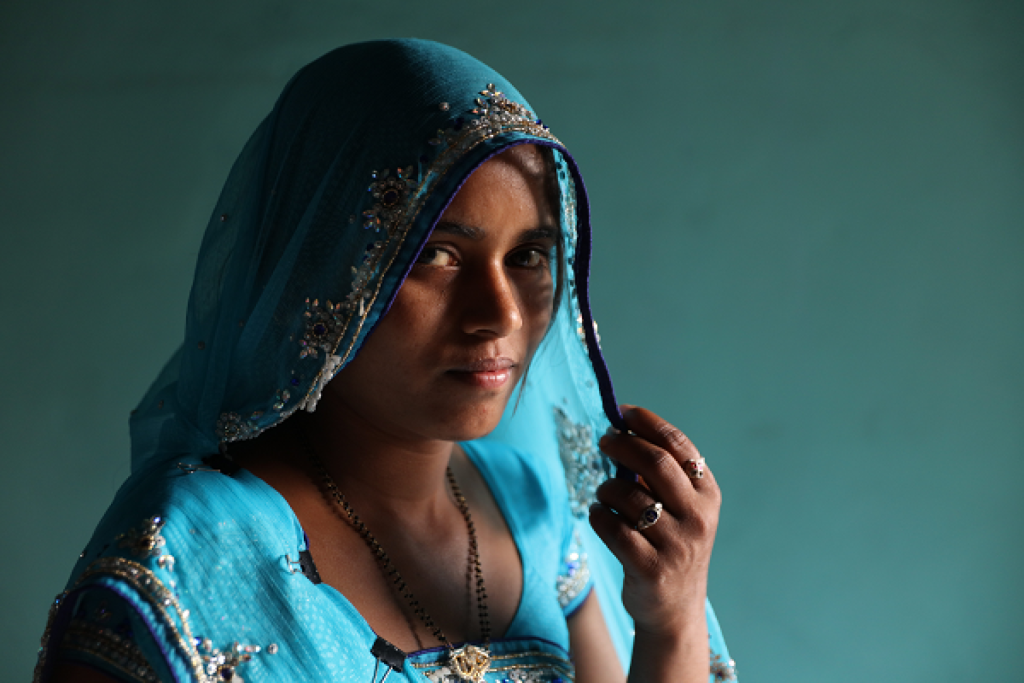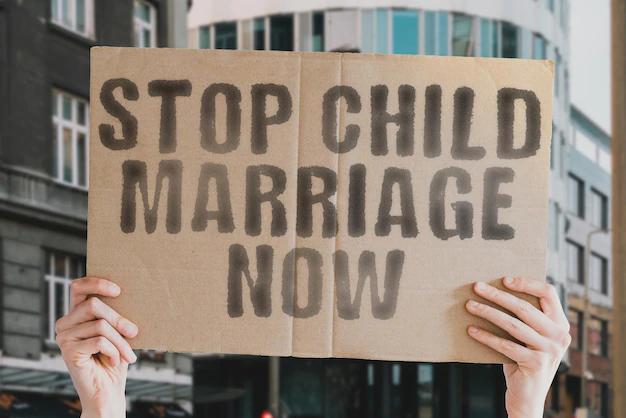A Violation That Needs to Be Stopped





Rapid population growth and dwindling resources are forcing people in some parts of the world to marry early. This traditional practice is often called “forced marriage.” Rural families facing extreme poverty may pressure their daughters into marrying much older men for money, land, or other resources. Sometimes girls are promised marriage as infants or even before they are born. The results can be devastating: young brides are more likely to experience domestic violence, have children at a young age, and lack education and economic opportunities. Sadly, there is little recourse for these women once they’re married.
It’s hard to believe that in this day and age, forced marriage is still a reality for many people across the globe. Regarding marriage, some couples have the luxury of a choice. But for many people around the world, marriage is an imposed institution that can be Forced. In some cultures, it’s considered a tradition to force someone to marry against their will. This is not only an abuse of human rights, but it can also lead to mental and physical health problems for the victim. Here we’ll be discussing everything about forced marriage: what it is, how it affects victims, and ways we can work together to end this human rights violation. Read on to learn more so we can stop forced marriage once and for all.
What Is Forced Marriage?
A forced marriage is one where someone is coerced or physically forced into marriage against their will. This can include physical, emotional, or financial pressure from family members or other individuals. In some cases, threats of violence may also be used to force someone into marriage. Forced marriages often involve a lack of choice and agency for the individual, leading to feelings of fear and helplessness. Unfortunately, this practice is still prevalent in many parts of the world, especially in Asia, and can lead to significant harm and trauma for the person forced into marriage.
Arranged Marriage vs Forced Marriage
Both parties consent to the union in an arranged marriage and can decline the arrangement. This type of marriage is more common in cultures where families play a large role in selecting a partner for their children. While in a forced marriage, one or both parties do not give their full consent and may be pressured or coerced into the marriage. This practice is illegal and violates the rights of individuals. It can also lead to abuse and trauma for those involved. It is important to remember that even in an arranged marriage, true consent must be present. Pressure from family or societal expectations does not count as true consent, and any marriage without full consent from both parties could be considered a forced marriage.
Why do Force Marriages Happen?
There are several reasons why forced marriages happen. In many cases, it is seen as a way to protect the honour of the family or community. Parents or guardians may feel it is their duty to arrange a marriage for their child, even if the child does not want to marry. Other times, individuals may be forced into marriage to repay debts or resolve disputes. In some cases, threats of violence may also be used to force someone into marriage.
Poverty is also one of the main causes of forced marriage. In many parts of the world, girls are seen as a burden on their families because they require a dowry to be married off. Sometimes, parents may marry off their daughters to reduce their financial burden. This is especially common in rural areas where girls cannot contribute to family income.
Another common cause of forced marriages is insecurity. In regions where there is conflict or instability, girls may be married off as a way to protect themselves from harm. In some cases, girls may be married to older men who are seen as more capable of protecting them. This is particularly common in countries affected by war or natural disasters. Also gender inequality is another major cause of forced marriage. In many parts of the world, women are not seen as equal to men and are not given the same rights or opportunities. This can lead to girls being married off as a way to control their sexuality or as a way to benefit the family financially.
Risks of Forced Marriage – Domestic Violence
Victims of forced marriage often suffer numerous physical and mental health consequences due to the trauma they experience. These consequences can last a lifetime. Common health consequences include depression, anxiety, post-traumatic stress disorder (PTSD), eating disorders, substance abuse, and self-harm. Victims may also suffer from physical injuries due to violence or attempted escape. Also, rape and forced pregnancy risks are often higher in forced marriages.
Forced marriage also has negative impacts on the overall development of a country. When young girls are forced into marriage, they are often pulled out of school, which can have a ripple effect on the country’s development. In addition, child forced marriage can lead to early pregnancy and motherhood, leading to health complications for both the mother and child. Also, forced marriage often leads to a cycle of poverty as girls who are married off at a young age are often unable to access education or economic opportunities.
Who is Affected by Forced Marriage?
Forced marriage is a serious human rights violation that affects people from all walks of life. While it is most commonly associated with certain cultural communities, forced marriage can happen to anyone, regardless of social class, financial status, or sexuality. The Irish Traveller community, for example, has a long history of forced marriage. In recent years, however, the practice has become increasingly widespread among the Turkish community. In addition, Roma, Afghan, Bangali and Iranian women are also being forced into marriage at high rates.
In addition to women, forced marriage also affects lesbian, bi-sexual, gay, and transgender individuals who are perceived to be members of these communities. LGBT people are often forced into heterosexual marriages to “cure” their sexual orientation or gender identity. This can lead to further abuse and mental health problems for the individual.
Even Islam Religion Supports the Right to Consensual Marriage.
There are many misconceptions about Islam, and one of the most common is that it does not allow for consent to marriage. This could not be further from the truth; Islam actually supports the right to consensual marriage. Additionally, Islamic law requires both parties to give their explicit consent before a marriage can occur. Furthermore, individuals have the right to stipulate their conditions for marriage, such as dowry or living arrangements. Ultimately, consent is essential for a valid Islamic marriage, and any forced marriages are not by Islamic teachings.
What Can Be Done to Stop Forced Marriage?
Several things can be done to stop forced marriage. Firstly, raising awareness about the issue is key through education and public awareness campaigns. Secondly, law enforcement needs more resources to enforce the law effectively. Thirdly, support services for victims need to be improved, including providing more legal assistance and counselling services. Finally, the government needs to do more to prevent forced marriages from happening in the first place. This can be done by working with community leaders and families to change social norms that condone it.
5 Things To Do If You Are Facing Forced Marriage
Forced marriage is a serious human rights violation. However, if you are facing forced marriage, there are some things you can do to try and stop it from happening. Here are five things to do if you are facing forced marriage.
1. Contact the Women’s Cell of your Local Police Station.
The Women’s Cell is a special unit of the police that deals with crimes against women. For example, they may be able to help you if you are facing forced marriage.
2. File a Case Under the Domestic Violence Act.
The Domestic Violence Act is a law that protects women from violence by their husbands or other family members. If you face forced marriage, you can file a case under this law.
3. Contact the National Commission For Women.
The National Commission for Women is a government body that protects and promotes women’s rights. They may be able to help you if you are facing forced marriage.
4. Contact a Lawyer.
A lawyer can advise you on your legal rights and options if you face forced marriage. They can also help you file a case in court or take other legal action.
5. Find a Support Group.
Many organizations work to help people who are facing forced marriage. These organizations can provide emotional support and practical assistance, such as finding a safe place to stay or getting legal help.
Laws That Protect You From Forced Marriage
Article 16 of the Universal Declaration of Human Rights states that men and women have the right to enter marriage only with their free and full consent. The Convention on Consent to Marriage, Minimum Age for Marriage, and Registration of Marriages also prohibits forced marriage and sets the minimum age for marriage at 18 years old.
In many countries, there are specific laws against forced marriage as well. For example, in the United Kingdom, the Forced Marriage (Civil Protection) Act 2007 allows for court orders to protect those at risk of being forced into a marriage. In Australia, there are criminal penalties for forcing someone into marriage under the Crimes Legislation Amendment (Sexual Crimes Against Children and Community Protection Measures) Act 2011.
Bangladesh’s Struggle to Combat Forced Marriage
Forced marriage is a serious problem in Bangladesh. Bangladesh has the world’s third-highest prevalence of child marriage and the second-highest absolute number of women married before age 18 globally – 4,382,000. 4% of boys are married before the age of 18. Under the Child Marriage Restraint Act, the age of consent for marriage is 18 years for females and 21 years for males. However, this law is rarely enforced, and many underage girls are married off by their parents in secret. There are no specific laws in Bangladesh banning forced marriages of adults.
However, in 2010, the Bangladesh parliament passed the Domestic Violence (Protection and Prevention) Act, which criminalized domestic violence. But few people are aware of the law, and even fewer women dare to report such crimes for fear of retribution. Moreover, the law is not effectively enforced due to a lack of resources and trained personnel. As a result, forced marriage remains a major problem in Bangladesh. In a March 2013 report, UNICEF noted that Bangladesh has a high rate of child marriage, with 66% of girls entering into marriage before reaching 18. Child marriage is still customary throughout Bangladesh, and it is often difficult to prove an individual’s age at the time of the marriage due to rampant noncompliance with birth registration laws and the forging of affidavits by guardians.
The Bangladesh government has acknowledged the problem of forced marriage and taken some steps to combat it. For example, in 2016, the government launched a national helpline for victims of violence, including forced marriage. The helpline provides counselling and legal assistance to victims and offers referrals to other support services. However, much more must be done to address Bangladesh’s forced marriage problem effectively.
Final Verdict:
Forced marriage is a human rights violation that remains prevalent in many parts of the world, including Bangladesh. Girls and women forced into marriage often face risks such as domestic violence and struggle to live happy, healthy lives. We must be aware of this problem and do what we can to help end it. Some organizations work to combat forced marriage, and you can support them in their efforts by donating or spreading awareness about this issue. You can also contact your local representatives and tell them that you think forced marriage should end. Together, we can make a difference and help ensure everyone has the right to choose who they marry.

